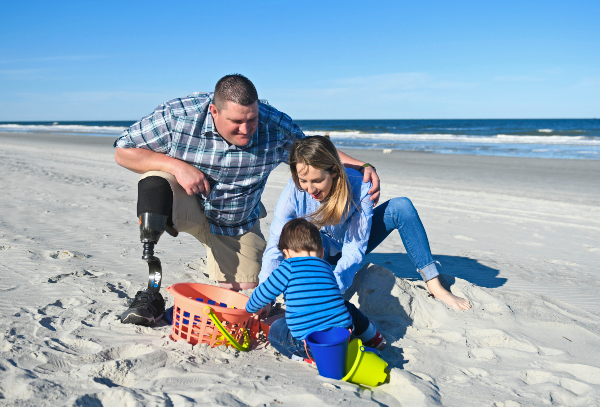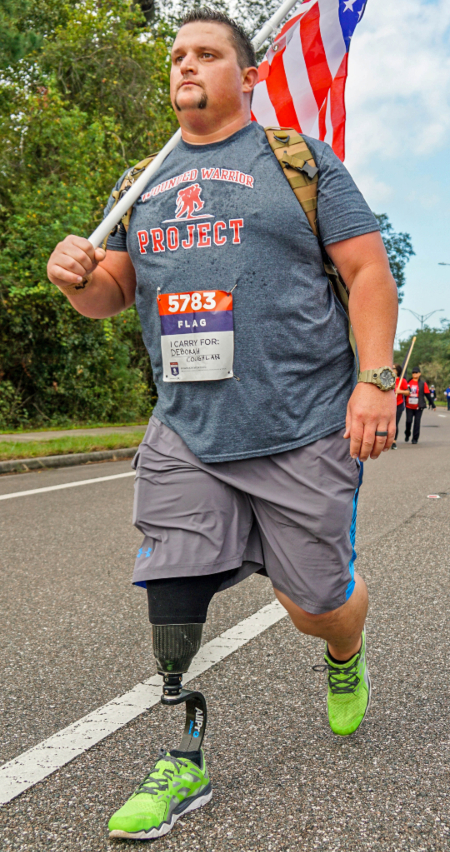Life Beyond the Wounds of War: Army Veteran Bryan Wagner Goes from Wounded to Awesome with Help from WWP, Family, Friends

By age 21, Bryan Wagner lost his leg to combat injuries and spent two years enduring surgeries and doing rehab. Despite the hurdles he faced as a young veteran, he was constantly challenging himself to move forward – and by age 25, he became known for not letting anything “stand in the way of awesomeness.”
Bryan had many reasons to feel the effects of post-traumatic stress disorder (PTSD), but he didn’t give PTSD a chance to take hold. He had parents, siblings, friends, and Wounded Warrior Project® (WWP) in his corner.
He received a bag with personal items from WWP while undergoing surgeries and rehab at Walter Reed National Military Medical Center. He admits it wasn’t his best day of rehab, and, at first, he brushed off the WWP visitor. However, the visitor persisted, and Bryan still talks about the significance of that visit.
“I was given two things that day: a backpack and a promise that Wounded Warrior Project will always be there for me, and they have,” Bryan said.
Thankfully, Bryan opened himself to receive help and support. And he kept looking forward.
“When you lose a body part, you look at yourself differently,” Bryan said. “It’s a big change, and there was a whole new world that I didn’t understand. Believe it or not, I was concerned about how to play catch with my son – even though I didn’t have a family yet. But I knew that I would want to have a family one day.
“During the early days, these three things sustained me: family, faith, and Wounded Warrior Project – that was my support system.”
After several surgeries to salvage his injured leg, Bryan concluded that amputation and prosthesis would allow him to stay more active and unencumbered.
“I could still walk and run. I went scuba diving, skydiving, mountain climbing – I always thought that ability is a state of mind,” Bryan said.
The Mountains He Climbed
Bryan connected with other veterans at Walter Reed. He also stayed in touch with WWP and signed up for connection events, Soldier Ride, physical health and wellness, and career counseling. He eventually took on a leadership role at WWP, inspiring others to challenge themselves and stay engaged.
“Who you surround yourself with is huge as far as injury recovery and mental health,” Bryan said. “Without help from Wounded Warrior Project, I would’ve been a guy who gets out of the military and just does a bare minimum. I would have been a statistic.”
Bryan medically retired from the military in December 2009. In January 2010, he moved from California to Florida to start career counseling, mental health support, and veteran connection through WWP.
WWP gave Bryan the tools to ease into going back to school. Eventually, he obtained a bachelor’s degree in athletic training and continued to graduate school to earn a doctorate degree in occupational therapy.
Throughout his professional and personal milestones, he stayed close to WWP, participated in Soldier Ride in Washington, DC, met his future wife, and continued to challenge himself to reach new heights.
In 2011, WWP offered Bryan the opportunity to climb Mount Kilimanjaro, the fourth-largest mountain in the world and the tallest in Africa, with a team of four veterans and three NFL players. Through corporate sponsorships, the team of warriors had the chance to train together and then travel to Tanzania to acclimate and then begin their ascent.
“Disability is a state of mind,” Bryan said. “You can’t let something like losing a limb stop you from doing what you want to do.”
Bryan and the team persisted, reaching the top of Mount Kilimanjaro in freezing weather, at dawn, after five days of hard climbing, including climbing overnight.
“The sun came up as we reached the summit, and there we were, looking down over Africa,” Bryan said when interviewed for a newspaper in his native California. “We did something most people can’t do.”
Bryan has done many things most people don’t usually do – everything from skydiving to scuba diving to endurance events. His resilient spirit and the support he has opened himself to have allowed him to build a life beyond his expectations.
What would Bryan say to his younger self?
“There will be dark days, and sunlight will come after those days,” Bryan said. “The time you’ll get to spend in the sunlight will be brighter and longer. I would also say to my younger self to do it for more than yourself. Fifteen years ago, I didn’t have a family. Shortly after my amputation, I was lying on a hospital bed, wondering what can I do? I was a 21-year-old who was asking himself, ‘How can I be a disabled vet?’ I was already thinking, ‘I am a disabled vet, but that’s not who I am.’ That doesn’t define me.”
A Warrior Defining Himself and His Future

For Bryan, who always knew he wanted to dedicate his life to helping others, surviving was not the question. The big issue for him was guilt. Bryan began to process those feelings after spending time with other veterans.
“At first, the guilt I felt had to do with my position as the gunner the day of the explosion and thinking that I had failed my truck because I didn’t take out an enemy before the bomb was detonated,” Bryan said. “Talking to other veterans helped a lot.”
Connecting with veterans who were further along on their healing journeys helped Bryan let go of unfounded guilt. Looking back, Bryan said healing the physical wounds was easier than the mental health aspects.
“The mental health aspect is so vast,” Bryan said. “There are so many pieces that have to come together for optimal mental health, and having the support you need is so important. We tend to keep it all bottled up. But it’s OK to have these feelings. My wife helps me reinforce that it’s OK to have feelings.”
“It’s great that WWP is here for us,” Bryan added. “I would say to other warriors that you have to be brave to be vulnerable. It’s OK to open up. And it’s important to surround yourself with support.”
Through his connection to other veterans and strong family support, Bryan is on his way to finding new ways to give back. He would like to use his doctorate degree to help veterans in the VA system rehabilitate and live full lives beyond physical limitations.
“I like to help people, and I don't think that desire is ever going to leave me,” Bryan said. “That's why I've chosen a career path that allows me to support veterans.”
“For so long, I was the patient,” Bryan said. “I was the one receiving physical and occupational therapy. Now I get to see patients taking their first step in walking again. Sometimes, something as simple as grabbing a cup of water and drinking on their own is amazing. I love working with people and watching them do things on their own. Even as I think back on my darkest times, being able to help others and watching them gain independence has been so rewarding.”
Connect with other veterans and start your healing journey.
Contact: Raquel Rivas – Public Relations, rrivas@woundedwarriorproject.org, 904.426.9783
About Wounded Warrior Project
Since 2003, Wounded Warrior Project® (WWP) has been meeting the growing needs of warriors, their families, and caregivers — helping them achieve their highest ambition. Learn more.
-->